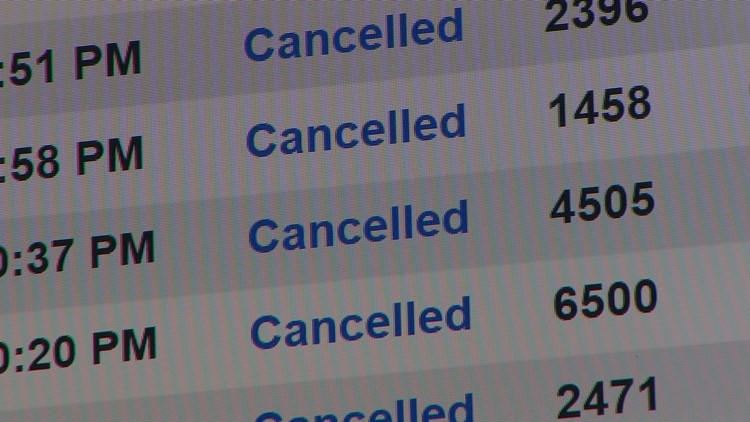SAN DIEGO — Airlines have significantly reduced the number of flights and destinations from San Diego International Airport as many people avoid unnecessary travel during the pandemic.
The Regional Airport Authority, which operates the airport, declared an emergency after an estimated 96% reduction in passengers earlier this month.
In an effort to stay afloat, airlines have applied for federal money under the Coronavirus Aid, Relief, and Economic Security Act. The CARES Act stipulates airlines must maintain a minimum service level through Sept. 30 to get the money, but also allows for exemptions.
Hawaiian Airlines was the first to request permission to stop flying to San Diego, among other airports, on April 9. The airline told regulators “Hawaiian will be ready to reinstitute service when it is reasonable and practicable to do so.” On April 17, the Department of Transportation granted its request through Sept. 30, although published schedules show Hawaiian may resume flights to San Diego in June.
On April 13, Allegiant Air requested an exemption for flights to Bellingham, Wash., El Paso and McAllen, Tex., which are all destinations it serves from San Diego. Allegiant claimed the airports largely serve customers from Canada and Mexico, respectively, and it saw a large decrease in demand because of cross-border restrictions.
The DOT granted its request for Bellingham and McAllen through June 30 but denied Allegiant in El Paso because it only must fly one flight a week to the city under the CARES Act requirements. Published schedules indicate Allegiant may resume flying to San Diego from some cities on June 1 and it will expand service to additional cities, as previously announced, later in the month.
RELATED: Otay Mesa Port of Entry hours of operation changed
Sun Country Airlines followed Allegiant on April 14. The leisure airline said planes were between 5% and 14% full for April and were on track to be between 7% and 20% full in May. It requested an exemption for flights to San Diego through June 15, but the DOT granted it through June 21.
Finally, on April 27, JetBlue requested permission to stop flying to San Diego. The New York-based airline planned to fly here as much as five times a day from cities on the east coast. Instead, in April, it flew as few as six times a week and reported flights were, on average, less than 9% full.
“The service is not sustainable for JetBlue to operate at current demand levels and JetBlue is seeking flexibility to serve SAN below the minimum service levels defined in the order, including the ability to temporarily suspend service,” wrote JetBlue in its filing to the DOT.
While JetBlue wrote it would make changes to its schedule based on demand, it requested an exemption to serve San Diego, and 15 other cities, through Sept. 30.
Prior to the filing, JetBlue’s published schedule showed it planned to operate service twice a week to both Boston and New York with a stop in Las Vegas starting on May 7. Non-stop service was scheduled to resume on June 11 to New York and Fort Lauderdale with Boston resuming July 1.
The New York Times reported earlier in the week that the department announced it had rejected most of the requests by United and Frontier to suspend some flights. This caused some airlines to begin operating “tag” flights where planes stop at multiple nearby cities, such as JetBlue’s service to Las Vegas, which it doesn’t usually serve from San Diego.
The DOT accepts and considers public comment prior to making a ruling. Local leaders are also notified when an airline requests an exemption. As of Wednesday evening, no public comment had been submitted opposing the reduction in service to San Diego. Several letters supporting the reduction by Hawaiian Airlines were submitted by officials in Hawaii, which currently requires arriving passengers to undergo a 14-day quarantine and is actively encouraging tourists to leave.
Most other airlines have reduced service to San Diego, but aren’t required to seek an exemption because they are flying at, or above minimum levels required under the CARES Act.



